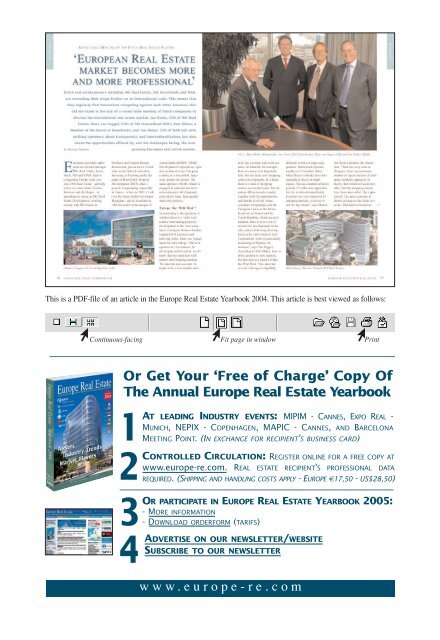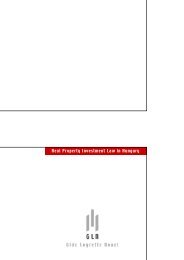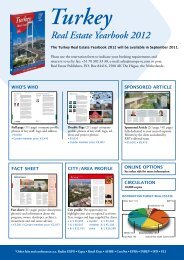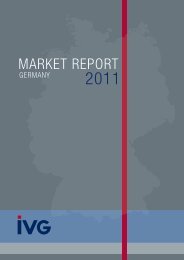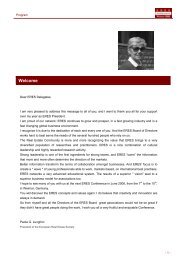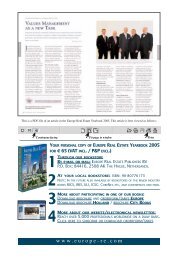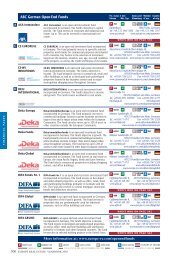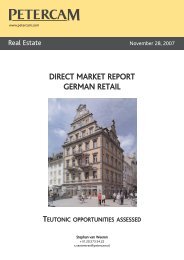Download PDF file of original printed version - Europe Real Estate
Download PDF file of original printed version - Europe Real Estate
Download PDF file of original printed version - Europe Real Estate
Create successful ePaper yourself
Turn your PDF publications into a flip-book with our unique Google optimized e-Paper software.
This is a <strong>PDF</strong>-<strong>file</strong> <strong>of</strong> an article in the <strong>Europe</strong> <strong>Real</strong> <strong>Estate</strong> Yearbook 2004. This article is best viewed as follows:<br />
Continuous-facing Fit page in window Print<br />
Or Get Your ‘Free <strong>of</strong> Charge’ Copy Of<br />
The Annual <strong>Europe</strong> <strong>Real</strong> <strong>Estate</strong> Yearbook<br />
1<br />
2<br />
3<br />
4<br />
AT LEADING INDUSTRY EVENTS: MIPIM - CANNES, EXPO REAL -<br />
MUNICH, NEPIX - COPENHAGEN, MAPIC - CANNES, AND BARCELONA<br />
MEETING POINT. (IN EXCHANGE FOR RECIPIENT’S BUSINESS CARD)<br />
CONTROLLED CIRCULATION: REGISTER ONLINE FOR A FREE COPY AT<br />
www.europe-re.com. REAL ESTATE RECIPIENT’S PROFESSIONAL DATA<br />
REQUIRED. (SHIPPING AND HANDLING COSTS APPLY - EUROPE €17,50 - US$28,50)<br />
OR PARTICIPATE IN EUROPE REAL ESTATE YEARBOOK 2005:<br />
- MORE INFORMATION<br />
- DOWNLOAD ORDERFORM (TARIFS)<br />
ADVERTISE ON OUR NEWSLETTER/WEBSITE<br />
SUBSCRIBE TO OUR NEWSLETTER<br />
www.europe-re.com
INTERVIEW<br />
76<br />
ROUND TABLE MEETING OF TOP DUTCH REAL ESTATE PLAYERS<br />
‘EUROPEAN REAL ESTATE<br />
MARKET BECOMES MORE<br />
AND MORE PROFESSIONAL’<br />
Dutch real estate players including ING <strong>Real</strong> <strong>Estate</strong>, AM, Bouwfonds and MAB,<br />
are stretching their wings further on an international scale. This means that<br />
they regularly find themselves competing against each other. However, this<br />
did not stand in the way <strong>of</strong> a round table meeting <strong>of</strong> Dutch companies to<br />
discuss the international real estate market. Jan Doets, CEO <strong>of</strong> ING <strong>Real</strong><br />
By Marinus Dijkman<br />
<strong>Estate</strong>; Hans van Veggel, COO <strong>of</strong> AM (Amstelland MDC); Bart Bleker, a<br />
Member <strong>of</strong> the Board <strong>of</strong> Bouwfonds; and Ton Meijer, CEO <strong>of</strong> MAB talk with<br />
striking openness about transparency and internationalization, but also<br />
about the opportunities <strong>of</strong>fered by, and the challenges facing, the ever-<br />
<strong>Europe</strong>an real estate ambitions<br />
are divided amongst<br />
ING <strong>Real</strong> <strong>Estate</strong>, Bouwfonds,<br />
AM and MAB. Each is<br />
conquering <strong>Europe</strong> in its own<br />
way. ING <strong>Real</strong> <strong>Estate</strong> – globally<br />
active as a real estate investor,<br />
financier and developer – is<br />
spreading its wings as ING <strong>Real</strong><br />
<strong>Estate</strong> Development, working<br />
closely with ING banks in<br />
Chodov, Prague, the Czech Republic (AM).<br />
EUROPE REAL ESTATE YEARBOOK 2004<br />
growing <strong>Europe</strong>an real estate market.<br />
Southern and Eastern <strong>Europe</strong>.<br />
Bouwfonds, just as active worldwide<br />
in the field <strong>of</strong> real estate<br />
financing, is focusing under the<br />
name <strong>of</strong> Bouwfonds Property<br />
Development (BPD), after a<br />
period <strong>of</strong> regrouping, especially<br />
in France - where in 2003 it took<br />
over the home builder/developer<br />
Marignan - and in Scandinavia.<br />
AM, the result <strong>of</strong> the merger <strong>of</strong><br />
Amstelland and MDC (Multi<br />
Development Corporation), operates<br />
in almost every <strong>Europe</strong>an<br />
country as a successful, largescale<br />
project developer. The<br />
same applies to MAB, which is<br />
engaged in national and international<br />
project development,<br />
particularly large, high quality<br />
inner-city projects.<br />
<strong>Europe</strong>: the ‘Wild West’?<br />
In answering to the question <strong>of</strong><br />
whether there is a ‘wild west’<br />
culture surrounding property<br />
development in the ‘new countries’,<br />
<strong>Europe</strong>an business leaders<br />
respond with grimaces and<br />
knowing looks. Hans van Veggel<br />
starts the ball rolling. “AM now<br />
operates in 12 countries. As<br />
developers and investors, we all<br />
know that we must deal with<br />
mature and fledgling markets.<br />
We take this into account. To<br />
begin with, a new market natu-
F.l.t.r.: Bart Bleker (Bouwfonds), Jan Doets (ING <strong>Real</strong> <strong>Estate</strong>), Hans van Veggel (AM) and Ton Meijer (MAB).<br />
rally has a certain wild west scenario.<br />
In Istanbul, for example,<br />
there are many new hypermarkets,<br />
but not many new shopping<br />
center developments. In Athens,<br />
there is a lack <strong>of</strong> shopping<br />
centers across the board. The situation<br />
differs in each country,<br />
together with the opportunities<br />
and threats involved. Some<br />
countries will perhaps join the<br />
<strong>Europe</strong>an Union in the future.<br />
However, in Poland and the<br />
Czech Republic, which are new<br />
markets, there is now a lot <strong>of</strong><br />
interest for developments in the<br />
city centers, following development<br />
in the outer districts first.<br />
Construction work is particularly<br />
interesting in Warsaw, for<br />
instance”, says Van Veggel.<br />
According to Bart Bleker, there is<br />
little certainty in new markets,<br />
but that does not mean it is like<br />
the Wild West. “The idea that<br />
you are entering a completely<br />
different world is a huge exaggeration.<br />
Bouwfonds operates<br />
mostly in EU member states,<br />
where there is already more harmonization<br />
than you might<br />
expect. The ten countries about to<br />
join the EU <strong>of</strong>fer new opportunities<br />
for us almost immediately.<br />
Investors are very interested. In<br />
emerging markets, you have to<br />
sell for big returns”, says Bleker.<br />
Zlote Tarasy, Warsaw, Poland (ING <strong>Real</strong> <strong>Estate</strong>).<br />
Jan Doets continues the discussion.<br />
“That was very clear in<br />
Hungary, where an enormous<br />
number <strong>of</strong> square meters <strong>of</strong> retail<br />
space suddenly appeared. In<br />
theory, that would not seem possible.<br />
But the shopping centers<br />
have been successful. The explanation?<br />
The gray economy is<br />
almost as large as the white economy.<br />
That had not been fore- >><br />
YEARBOOK 2004 EUROPE REAL ESTATE 77<br />
INTERVIEW
INTERVIEW<br />
78<br />
cast. I will just say this: each<br />
country has its own special characteristics.<br />
That’s why you need<br />
local knowledge and should use<br />
it properly. Note that Spain and<br />
Portugal, countries we now think<br />
<strong>of</strong> as a home market, were also<br />
in a development phase in our<br />
sector not so long ago.”<br />
Ton Meijer adds, “Local knowledge<br />
is perhaps the most important<br />
factor if you wish to find new<br />
markets. In countries that are new<br />
to us, we attempt to combine<br />
respect for local culture and<br />
customs with our expertise and<br />
working methods. All MAB top<br />
managers in <strong>Europe</strong> are top local<br />
specialists. However, a second<br />
component is essential for the internationalization<br />
<strong>of</strong> a developer.<br />
Do you have something to <strong>of</strong>fer<br />
the ‘new’ country that is not already<br />
there, or not there to a sufficient<br />
degree? Know-how, financial<br />
opportunities, and creativity<br />
are examples”.<br />
‘Local Touch’<br />
The economies <strong>of</strong> <strong>Europe</strong>an<br />
countries are growing towards<br />
each other at a fast rate. Bleker<br />
responds resignedly to the proposition<br />
that in the process <strong>of</strong> unification,<br />
<strong>Europe</strong> has let Germany<br />
down somewhat and that this has<br />
been rather short-sighted given<br />
Ton Meijer, CEO <strong>of</strong> MAB<br />
EUROPE REAL ESTATE YEARBOOK 2004<br />
Bart Bleker, Member <strong>of</strong> the Board<br />
<strong>of</strong> Bouwfonds<br />
the international importance <strong>of</strong><br />
the German economy for <strong>Europe</strong>.<br />
“Yes, I think this is the most important<br />
reason for the current<br />
economic malaise”, states<br />
Bleker. Doets continues, “In the<br />
euphoria <strong>of</strong> the unification,<br />
banks and businesses in West<br />
Germany were encouraged<br />
through tax schemes to invest<br />
particularly in the East. But what<br />
we saw was that what mortgage<br />
banks were earning was being lost<br />
again in East Germany. The<br />
problem has been seriously<br />
underestimated by everyone.”<br />
Van Veggel thinks the Germans<br />
have gotten themselves back on<br />
track. “This year, there has been<br />
a definite turnaround compared<br />
to last year. It is a big country,<br />
but investors always choose the<br />
large cities like Frankfurt,<br />
Munich, Hamburg, Berlin and<br />
Cologne. We began in a few<br />
small towns in the Ruhr. We had<br />
to work really hard there to sell<br />
anything. Nevertheless, this<br />
region seems an interesting one<br />
for us in the context <strong>of</strong> project<br />
development.”<br />
Ton Meijer agrees. “We<br />
absolutely believe in the potential<br />
<strong>of</strong> the German market in the<br />
sector where we operate. We<br />
have a development in Frankfurt<br />
with the ‘Zeil’ project, worth<br />
almost € 800 million, in a joint<br />
venture with Bouwfonds Property<br />
Finance. In Berlin we are developing<br />
the Media Hotel, while we<br />
have other mid-sized and big<br />
projects at an early stage <strong>of</strong><br />
development in various other<br />
cities. They are all projects in top<br />
locations in the bigger inner<br />
cities. In our view, well-developed<br />
inner city projects can<br />
always withstand economic<br />
trends, even in Germany.”<br />
Bleker comments, “Everyone has<br />
their own <strong>Europe</strong>an focus. We are<br />
Zeil project, Frankfurt (MAB/BPF).<br />
operating in France and are very<br />
happy with a good partner. But in<br />
Scandinavia, we can also see a<br />
stable economy with good growth<br />
prospects. Our policy is: we’ll<br />
lead the pack, and the commercial<br />
real estate will follow. We are not<br />
looking towards Britain. There<br />
are too many huge parties<br />
involved and it isn’t easy to<br />
acquire a position in the housing<br />
market there. In Spain, we have<br />
been operational for much longer<br />
in investment. If that provides us<br />
with an interesting network, other<br />
activities will follow. That’s why
we are now looking for a Spanish<br />
partner we can work with to<br />
develop residential and perhaps<br />
commercial real estate.”<br />
Knowledge <strong>of</strong> markets<br />
Everyone taking part in the round<br />
table discussion agrees that the<br />
key to success in working in other<br />
countries is the mix <strong>of</strong> the qualities<br />
<strong>of</strong> all the parties involved: the<br />
developer, the business personnel,<br />
the investors, the clients and<br />
local authorities. According to Ton<br />
Meijer, “Local market knowledge,<br />
SOY Quest, St. Quentin - en Yvelines, France (MAB).<br />
knowledge <strong>of</strong> and involvement<br />
in local networks, and a business<br />
structure and culture focused on<br />
the collaboration <strong>of</strong> all business<br />
divisions in all countries is<br />
essential. However, we are more<br />
cautious in our international ambitions<br />
than other parties. Our first<br />
concern is the spread <strong>of</strong> risk. It is<br />
important that a market we operate<br />
in is integrated as quickly as possible<br />
into the total MAB organization,<br />
taking into account the<br />
management instruments we consider<br />
essential. We need to make<br />
it a home market as quickly as<br />
possible, since it is only then that<br />
we can find the good sites, keep<br />
close track <strong>of</strong> all the challenges<br />
and threats <strong>of</strong> such a market and<br />
fulfill our aspirations.”<br />
Hans van Veggel adds, “You can’t<br />
work in local markets from an<br />
institutional standpoint. There has<br />
to be an institutional structure, a<br />
business structure, but it remains<br />
unit production. You have to be an<br />
international company with a<br />
genuine local touch. You need to<br />
know the differences in rental, the<br />
different planing regulations and<br />
procedures, or else it’s very easy<br />
to make a mistake. But that is also<br />
the fun part <strong>of</strong> it - we are all in the<br />
same boat. As developers, we look<br />
at the market in a different way<br />
than investors. They look at<br />
regions such as Southern, Western<br />
and Central <strong>Europe</strong> from an<br />
economic perspective.<br />
Fluctuations in the economy<br />
determine the markets the developers<br />
will seek. Developers refer<br />
much more to terms such as<br />
mature markets, alternate markets,<br />
up-and-coming markets and new<br />
markets. From another perspective,<br />
the investor wants to spread<br />
his investment across markets. We<br />
find that in mature markets, the<br />
cities, locations and businesses<br />
need to be restructured. I think<br />
that the market for <strong>of</strong>fice space is<br />
in a rather disastrous situation<br />
throughout almost all <strong>of</strong> <strong>Europe</strong>.<br />
The economy will need to make a<br />
very positive swing before things<br />
improve again.”<br />
Jan Doets says, “I think that the<br />
economic recovery <strong>of</strong> <strong>Europe</strong><br />
will continue for another 4 or 5<br />
years. At ING <strong>Real</strong> <strong>Estate</strong>, we<br />
wear three hats: as financier,<br />
investor and developer. We don’t<br />
just work on our own portfolio,<br />
but also for funds with countless<br />
other investors who make use <strong>of</strong><br />
our experience. Accordingly, we<br />
look for products suitable for in-<br />
Jan Doets, CEO<br />
<strong>of</strong> ING <strong>Real</strong> <strong>Estate</strong><br />
vestment requirements. Housing,<br />
for example, produces low<br />
returns, but long-term growth.<br />
Office space closely follows economic<br />
fluctuations. Retail is<br />
somewhere between the two. The<br />
market for <strong>of</strong>fice space is now<br />
disrupted, but it is dynamic.<br />
Many lessees now expect to be<br />
able to find a better building for<br />
the same amount <strong>of</strong> money. That<br />
means that there are unoccupied<br />
buildings at the lower end <strong>of</strong> the<br />
market. Developers respond to<br />
this by redeveloping the building<br />
or the location, which is good<br />
news.”<br />
Van Veggel adds, “I think that<br />
the lessee is the key figure in the<br />
market for <strong>of</strong>fice space. The<br />
location is <strong>of</strong> secondary impor- >><br />
Hans van Veggel, CEO <strong>of</strong> AM.<br />
YEARBOOK 2004 EUROPE REAL ESTATE 79<br />
INTERVIEW
INTERVIEW<br />
80<br />
AAM (Amstelland MDC)<br />
AM NV (Amstelland MDC) is an area-oriented<br />
developer <strong>of</strong> urban centers, shopping centers,<br />
housing estates, <strong>of</strong>fices and <strong>of</strong>fice parks, operating<br />
on a <strong>Europe</strong>an scale. The company is the<br />
market leader in the Netherlands and holds a<br />
leading position in the property development<br />
Hans van Veggel, sector in <strong>Europe</strong> (annual turnover <strong>of</strong> approxi-<br />
CEO <strong>of</strong> AM.<br />
mately € 1.4 billion). AM has projects under<br />
development in the Netherlands, Belgium, the<br />
Czech Republic, France, Germany, Portugal, Spain and the United<br />
Kingdom. As a creative knowledge organization, AM specializes in<br />
the design and development <strong>of</strong> living, working, shopping and<br />
recreational environments. AM was created in 2002 by the merger<br />
<strong>of</strong> Amstelland and Multi Development Corporation.<br />
tance. A lessee chooses a plan for<br />
which, if necessary, you can get<br />
land in another location.”<br />
<strong>Real</strong> estate funds<br />
The international real estate<br />
market is quickly becoming<br />
more pr<strong>of</strong>essional. Thanks to the<br />
introduction <strong>of</strong> listed and nonlisted<br />
real estate funds, institutional<br />
investors are better able to<br />
spread their investments worldwide<br />
and, if desired, according to<br />
investment type in order to take<br />
advantage <strong>of</strong> the stabilizing<br />
influence <strong>of</strong> real estate investment<br />
in their portfolios.<br />
EUROPE REAL ESTATE YEARBOOK 2004<br />
Bart Bleker agrees. “In times<br />
when interest rates are low and<br />
pr<strong>of</strong>its on stocks are meager, real<br />
estate is an additional lucrative<br />
product. We are trying to make<br />
ourselves more visible in the<br />
market. Thanks to real estate<br />
funds – and the healthy trade in<br />
stock therein – investors can now<br />
anticipate more quickly and<br />
investment in the real estate<br />
sector is on the increase.”<br />
Jan Doets adds, “We work with<br />
specific funds, such as retail<br />
funds, an <strong>of</strong>fice space fund or a<br />
housing fund, which are distributed<br />
across regions and conti-<br />
ING <strong>Real</strong> <strong>Estate</strong><br />
The core activities <strong>of</strong> ING <strong>Real</strong> <strong>Estate</strong> are<br />
carried out in three business lines:<br />
Jan Doets, CEO<br />
Development, Investment, Management and<br />
Finance. The global real estate firm (with<br />
<strong>of</strong>fices throughout <strong>Europe</strong> and in Singapore,<br />
China and Australia) concentrates its activities<br />
on retail, residential, <strong>of</strong>fices, logistics, parking<br />
<strong>of</strong> ING <strong>Real</strong> <strong>Estate</strong> facilities and leisure - either <strong>of</strong>fering these<br />
through one <strong>of</strong> its own business lines or by<br />
combining the services <strong>of</strong> more business lines. The firm ranks<br />
among the world’s three largest real estate players with assets<br />
under management <strong>of</strong> over € 40 billion. ING <strong>Real</strong> <strong>Estate</strong> is a<br />
member <strong>of</strong> the ING Group, a financial services firm with more than<br />
115,000 employees in 60 countries.<br />
nents. That way we cover a large<br />
number <strong>of</strong> areas and the investor<br />
has more options. We also advise<br />
on building up a portfolio. We<br />
purchase from third parties, but<br />
also from our own real estate<br />
development portfolio. However,<br />
our development company has to<br />
sell its products to other parties.<br />
We are very rigorous in this<br />
regard; if choice A would be to<br />
go directly to our own real estate<br />
funds and choice B to the<br />
market, the market would say<br />
‘keep them’. No, we believe that<br />
all our disciplines should be able<br />
Office building Le Millenium, Sopia-Antipolis,<br />
to stand on their own two feet.”<br />
“I see a very sunny future for<br />
real estate funds in general”,<br />
says Bart Bleker.<br />
“Yes, you can see now how<br />
pension funds are building up<br />
their own real estate apparatus.<br />
They are looking for pr<strong>of</strong>essional<br />
partners to fill this gap. We<br />
realize that synergy is created if<br />
you have more products, with all<br />
the tax and legal consequences.<br />
The process is faster here than if<br />
you have to invent the structure<br />
yourself”, Jan Doets agrees.<br />
What is also relevant is the distinction<br />
between investment in listed
and non-listed real estate funds.<br />
Jan Doets: “We have clearly<br />
shown in studies that listed funds<br />
show a correlation with stock<br />
market movements. In that sense,<br />
they look more and more like<br />
stock. To diversify your portfolio,<br />
you can use both. If they are listed,<br />
you have the risk – and volatility –<br />
<strong>of</strong> the stock market, while if they<br />
are non-listed, that risk is absent.”<br />
Hans van Veggel responds, “As a<br />
developer, I see real estate developments<br />
more than ever as a<br />
financial product. <strong>Real</strong> estate is<br />
more on the lookout for money.<br />
France (Bouwfonds).<br />
I think that a developer has<br />
become much closer to the financial<br />
institutions. That is true for<br />
both the ultimate purchaser <strong>of</strong> the<br />
project and for the project<br />
financier.”<br />
Ton Meijer endorses this. “I think<br />
as far as that’s concerned, with the<br />
three hats Doets referred to, ING<br />
has the best in-house concept:<br />
financing, development and<br />
investment. Adequate financing is<br />
essential for development. We<br />
consider ourselves lucky with the<br />
financiers who help us to realize<br />
our ambitions. But there are<br />
always the parties who prefer to<br />
Bouwfonds Holding<br />
As a multidisciplinary real estate company,<br />
Bouwfonds <strong>of</strong>fers turnkey solutions for all<br />
problems relating to the built-up environment:<br />
Development, Financing and Asset Management.<br />
Bouwfonds - established in 1946 -<br />
earned its reputation as the largest developer<br />
<strong>of</strong> owner-occupied houses in the Netherlands Bart Bleker,<br />
and now wants to become one <strong>of</strong> the leading Member <strong>of</strong> the Board<br />
real estate companies in <strong>Europe</strong>. In 2002, the <strong>of</strong> Bouwfonds<br />
company achieved a turnover <strong>of</strong> € 436<br />
million, with assets amounting to € 20 billion. Ambitions for the<br />
coming years include acquiring a strong position in the United<br />
States with its finance and investment products.<br />
make a pr<strong>of</strong>it as quickly as possible<br />
and move on. If you are also<br />
able to make consistently good<br />
products, and in all modesty we<br />
can do that, then as a developertrader<br />
you let go <strong>of</strong> too much<br />
value potential. That’s why we<br />
ultimately want a continuous<br />
involvement in our projects.”<br />
Bart Bleker adds, “I think that the<br />
importance <strong>of</strong> financial engineering<br />
in relation to real estate is<br />
becoming more and more important.<br />
Knowledge <strong>of</strong> structuring,<br />
the distribution <strong>of</strong> the product, has<br />
to be linked with knowledge <strong>of</strong><br />
real estate. This is an extremely<br />
interesting combination that you<br />
can make excellent use <strong>of</strong> for your<br />
own development company.” Jan<br />
Doets summarizes, “First, you<br />
need an understanding <strong>of</strong> real<br />
estate; second, an understanding<br />
<strong>of</strong> structured finance; and third,<br />
syndication: how do I get it sold.”<br />
Bart Bleker adds, “That way,<br />
interesting returns can be achieved<br />
for our clients as well as for ourselves.<br />
There is enormous growth<br />
in this market, even though the<br />
real estate where it comes from<br />
has already been created. For<br />
financial real estate parties,<br />
there are enormous prospects.”


